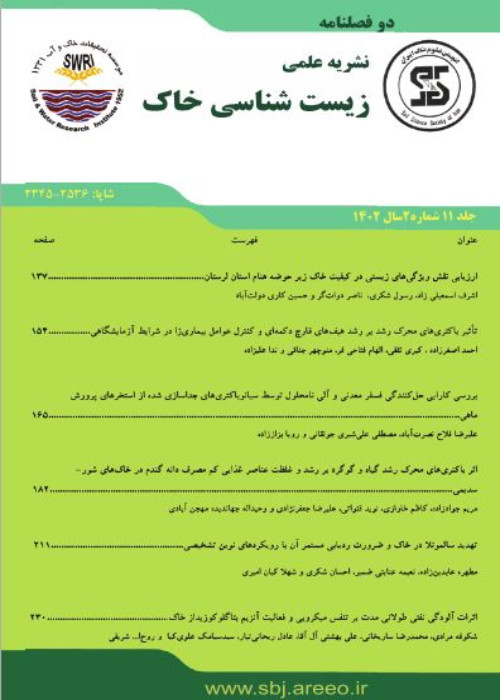Evaluation of plant growth promoting traits of arsenic resistant bacteria and their effect on morphological properties of Origanum vulgare plant in an arsenic-polluted soil
Author(s):
Abstract:
Application of plant growth promoting rhizobacteria (PGPR) increases the efficiency of phytoremediation in heavy metal polluted soil. In the present study, four arsenic-polluted soil samples were collected from around the Zarshooran mine in Tekab city located in the west part of Azarbaijan province. Forty two isolates were isolated from soil samples and nineteen isolates were selected according to the shape, color, margin of colony and growth rate. AHG-1, AHG-2, AHG-3, AHG-4, AHG-5, AHG-6, AHG-7, AHG-10, AHG-11, AHG-15 and AHG-6 isolates grew well in all arsenic concentrations but AHG-5, AHG-6 and AHG-7 had the greatest growth. Results showed that all selected isolates were able to produce auxin and solubilize inorganic phosphorus. The range of auxin production was 0.35-3.41 mg/l and the average value was 1.38 mg/l. The highest and lowest ability of inorganic phosphate solubilizing were 486.036 and 251.69 mg/l belonging to AHG-7 and AHG-10 isolates respectively. Six isolates were capable of solubilizing inorganic Zn whereas AHG-7 isolate was the most effective one. The ability of siderophore production was observed among 5 isolates that AHG10 was the most effective one. Four of ten isolates were able to produce low and moderate amount of hydrogen cyanide. In addition, a greenhouse experiment was conducted to evaluate the effect of arsenic-resistant bacteria on morphological characteristics of Oregano plant in a completely randomized design with three replications. Results of the greenhouse test showed that inoculation of Oregano with superior isolates significantly increased the leaf number, leaf surface, stem length, stem splits, root volume, root wet weight, root dry weight, shoot wet weight, and shoot dry weight of in an arsenic-polluted soil. Results also revealed that inoculation of Oregano with studied isolates notably (P≤0.01) increased root and shoot arsenic concentration and translocation factor. In this research Oregano plant showed great ability in transferring of arsenic from roots to shoots. It can be concluded that arsenic-resistant isolates with plant growth promoting ability increased the phytoremediation efficiency of arsenic-contaminated soil. It seems that Oregano can play a useful role in the remediation of arsenic-polluted soil.
Keywords:
Language:
Persian
Published:
Journal of Soil Biology, Volume:4 Issue: 2, 2017
Pages:
135 to 151
magiran.com/p1660968
دانلود و مطالعه متن این مقاله با یکی از روشهای زیر امکان پذیر است:
اشتراک شخصی
با عضویت و پرداخت آنلاین حق اشتراک یکساله به مبلغ 1,390,000ريال میتوانید 70 عنوان مطلب دانلود کنید!
اشتراک سازمانی
به کتابخانه دانشگاه یا محل کار خود پیشنهاد کنید تا اشتراک سازمانی این پایگاه را برای دسترسی نامحدود همه کاربران به متن مطالب تهیه نمایند!
توجه!
- حق عضویت دریافتی صرف حمایت از نشریات عضو و نگهداری، تکمیل و توسعه مگیران میشود.
- پرداخت حق اشتراک و دانلود مقالات اجازه بازنشر آن در سایر رسانههای چاپی و دیجیتال را به کاربر نمیدهد.
In order to view content subscription is required
Personal subscription
Subscribe magiran.com for 70 € euros via PayPal and download 70 articles during a year.
Organization subscription
Please contact us to subscribe your university or library for unlimited access!


